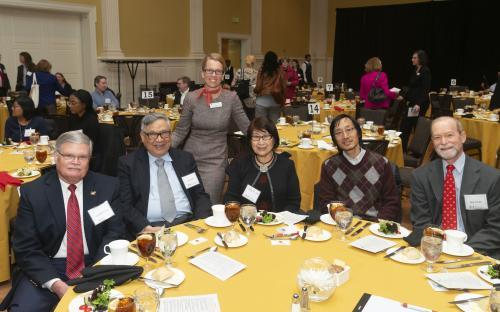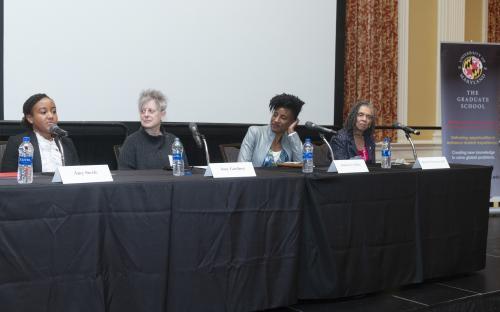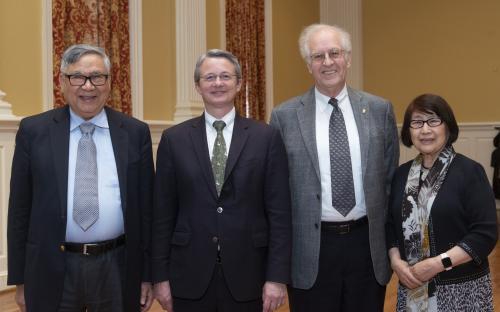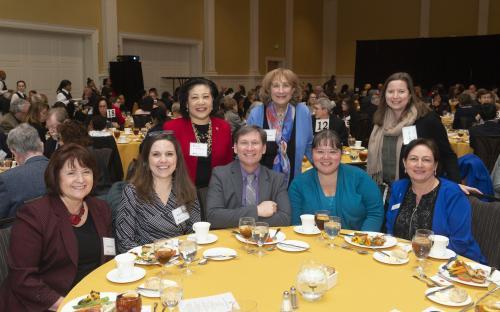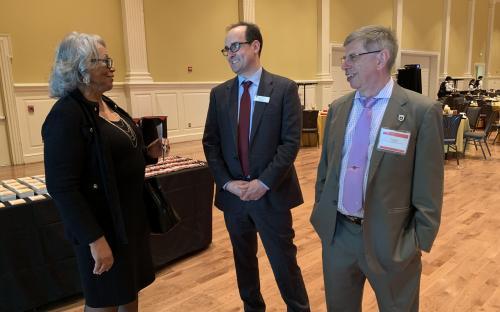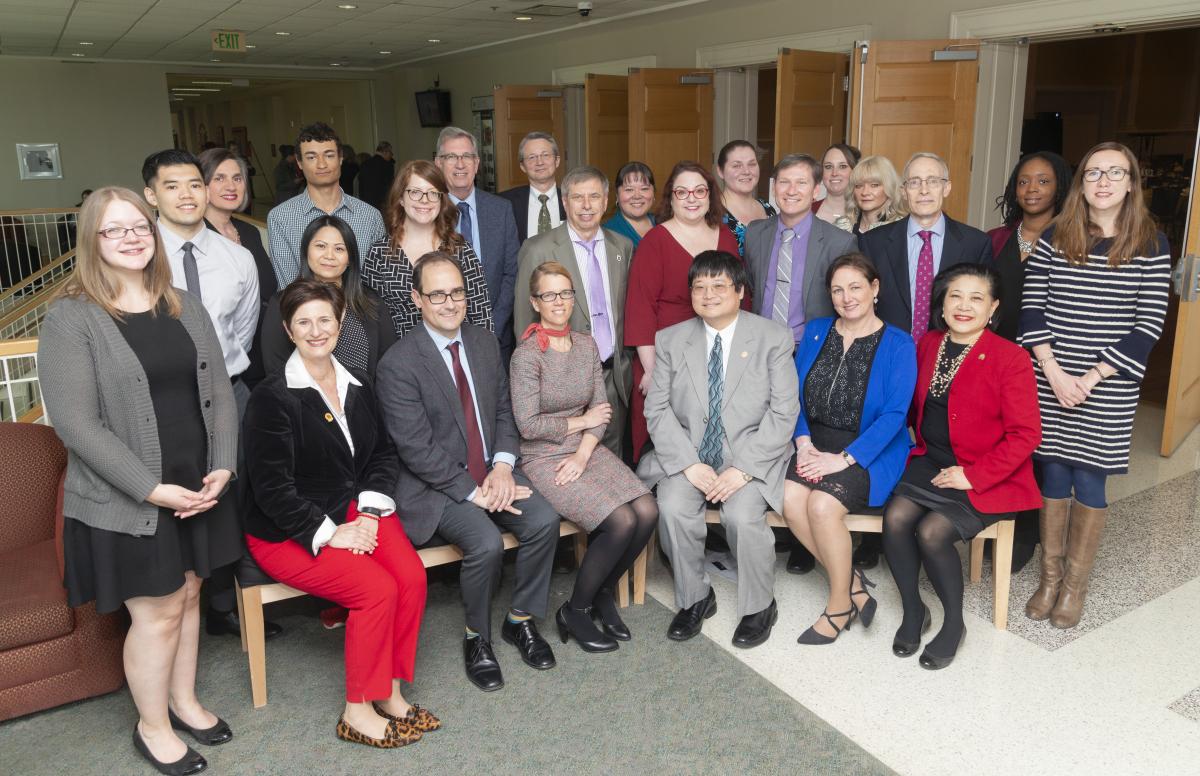 The Graduate School was established on March 14, 1919 with just 13 students. At yesterday's Centennial luncheon, over 200 people joined the celebration and discussed the future of graduate education at Maryland. President Wallace Loh, Brit Kirwan, Alan Leshner, Bonnie Thornton Dill, Kim Griffin, Amy Gardner, and Amy Steele headlined the event. In attendance were some of the Graduate School's former leaders--Ann G. Wylie, Johnetta G. Davis, Chuan Liu, Gay Gullickson, Timothy Ng, Saul Sosnowski, Jeffrey Franke, and Alex Chen.
The Graduate School was established on March 14, 1919 with just 13 students. At yesterday's Centennial luncheon, over 200 people joined the celebration and discussed the future of graduate education at Maryland. President Wallace Loh, Brit Kirwan, Alan Leshner, Bonnie Thornton Dill, Kim Griffin, Amy Gardner, and Amy Steele headlined the event. In attendance were some of the Graduate School's former leaders--Ann G. Wylie, Johnetta G. Davis, Chuan Liu, Gay Gullickson, Timothy Ng, Saul Sosnowski, Jeffrey Franke, and Alex Chen.
The first PhD was awarded in 1920 to Charles E. Sando for his work on “The Process of Ripening in the Tomato.” The first known international graduate student to earn a degree was Chunjen Constant Chen from China, who earned a master’s degree that same year. The first woman to earn a PhD was Daisy Inez Purdy in 1931, who went on to a successful faculty position at Oklahoma State University and had a leadership role in the state’s nutrition initiatives. Parren Mitchell was the first African-American full-time master’s graduate in 1952, following a landmark court decision that forced the University to enroll him. 1966 marked the first African-American doctorate, Rebecca Carroll, who used her talents to improve education in Baltimore City's schools. Since 1919, the university has awarded 120,000 graduate degrees, including nearly 27,000 doctoral and more than 93,000 master’s degrees.
In his habitual energetic manner, Dr. Brit Kirwan, Chancellor Emeritus of the University System of Maryland, was able to add more details to this distinguished history. He reminded listeners that the University and graduate 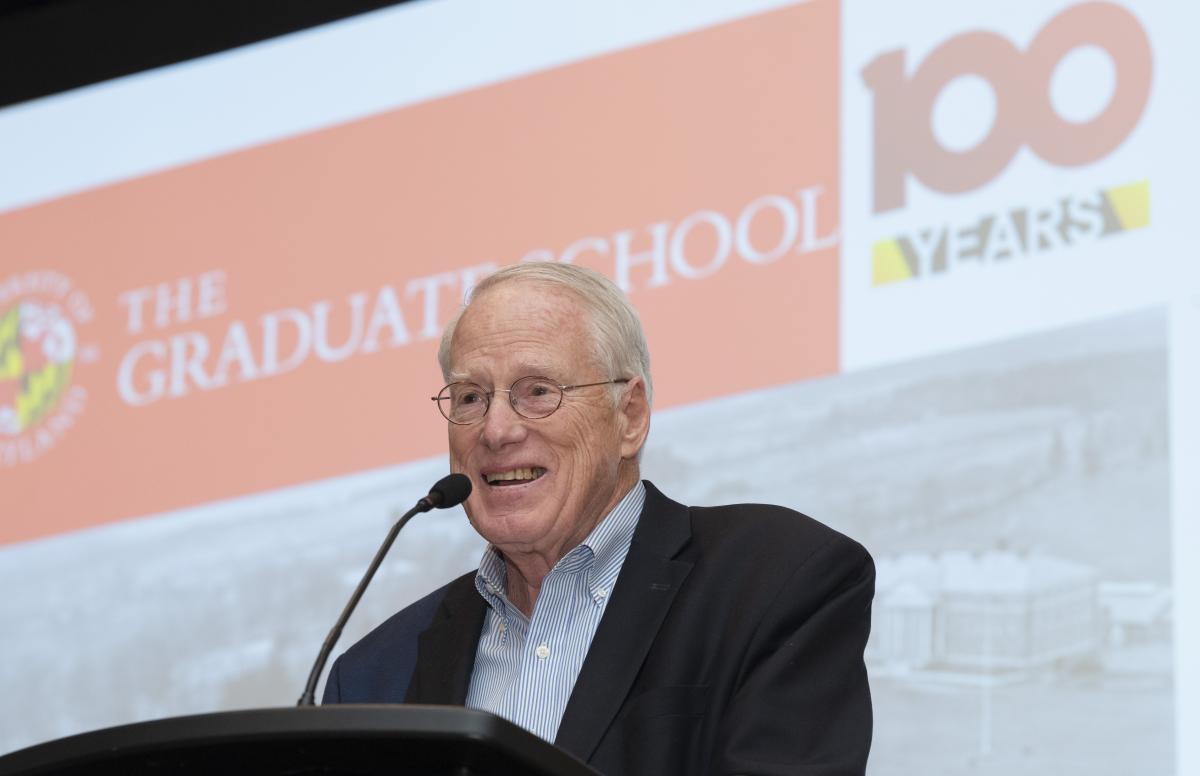 education was very much on the rise throughout the last 100 years. He recalled one particular event as a young UMD math professor during the Vietnam War. "We were sitting in a departmental seminar in the spring with the windows open, when we heard shouting and screaming. Students were protesting the [Vietnam] war and shut Route 1 down. The National Guard came and was trying to disperse the croud by shooting tear gas at the students, which came into our room. We started coughing, and I can still remember that day so clearly," he said. He went on to discuss the 1988 NRC Rankings, which according to Kirwan, catapulted UMD onto the national scene.
education was very much on the rise throughout the last 100 years. He recalled one particular event as a young UMD math professor during the Vietnam War. "We were sitting in a departmental seminar in the spring with the windows open, when we heard shouting and screaming. Students were protesting the [Vietnam] war and shut Route 1 down. The National Guard came and was trying to disperse the croud by shooting tear gas at the students, which came into our room. We started coughing, and I can still remember that day so clearly," he said. He went on to discuss the 1988 NRC Rankings, which according to Kirwan, catapulted UMD onto the national scene.
In looking ahead, Dr. Alan Leshner, CEO Emeritus of the American Association for the Advancement of Science and College Park Professor in the Department of Biology, reminded attendees that "graduate education is lagging behind in preparing graduates for the prospective workforce" and that 60% of PhDs do not go into academic positions after graduation. If we are to evolve, Leshner said, 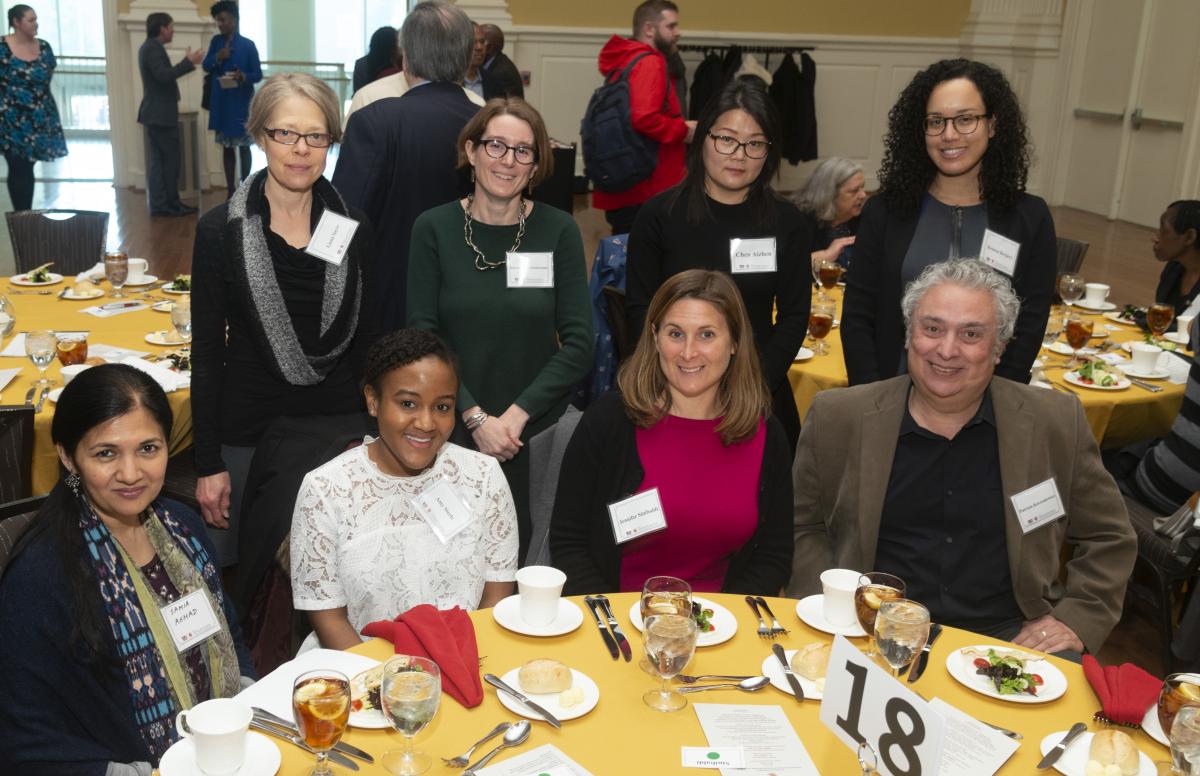 we have to allow students to pick programs based on outcome data, build a more diverse student body, create a more equitable and diverse academic culture, decide on core competencies, allow for greater career exploration and provide mentors/advisors with formal training. Cautioned Leshner, "If we don’t focus on students and their needs, then, we won’t make it. Saying we want to continue to produce little us's just won't work for the next century."
we have to allow students to pick programs based on outcome data, build a more diverse student body, create a more equitable and diverse academic culture, decide on core competencies, allow for greater career exploration and provide mentors/advisors with formal training. Cautioned Leshner, "If we don’t focus on students and their needs, then, we won’t make it. Saying we want to continue to produce little us's just won't work for the next century."
During the main course, each table discussed different aspects of graduate education: core competencies, enterprise-wide and program-level professional development, opportunities to explore non-academic career paths, strategies for strengthening mentoring/advising, 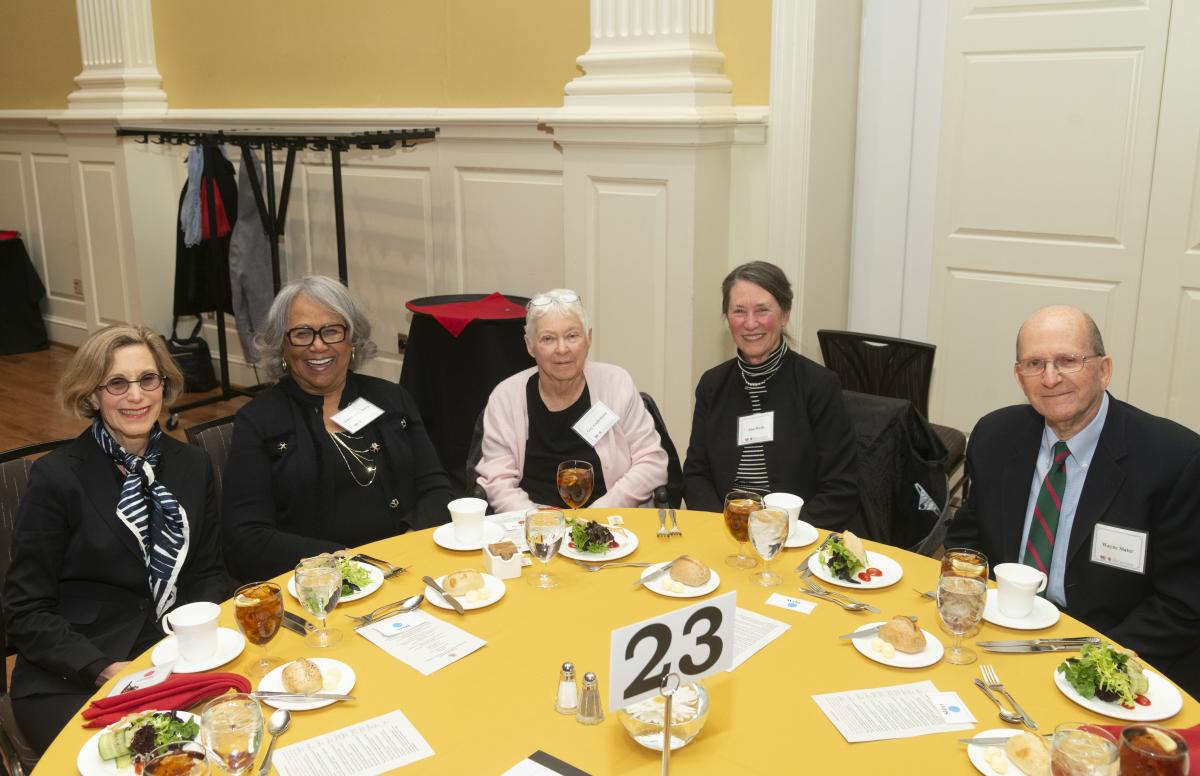 how to better serve the evolving and diverse student body, the structure of the dissertation process, creating more interdisciplinary graduate student research, the role of professional education within institutions, the use of outcome and enrollment data, and supporting international graduate students and their ability to study at Maryland. "The table discussions really set a road map for the future, and our conversation was truly profound and productive," remarked Susan Martin after the event. The Graduate School plans to compile each table's notes for further use and publish them on its Centennial site.
how to better serve the evolving and diverse student body, the structure of the dissertation process, creating more interdisciplinary graduate student research, the role of professional education within institutions, the use of outcome and enrollment data, and supporting international graduate students and their ability to study at Maryland. "The table discussions really set a road map for the future, and our conversation was truly profound and productive," remarked Susan Martin after the event. The Graduate School plans to compile each table's notes for further use and publish them on its Centennial site.
The celebration ended with a compelling panel presentation by Griffin, Thornton Dill, Gardner and Steele. Each stressed the importance of innovation and collaboration in graduate education. Dr. Bonnie Thornton Dill, the Dean of the College of Arts and Humanities, discussed interdisciplinary programs within her college, and trying to foster further collaboration. Dr. Kimberly Griffin, associate professor in the Department of Counseling, Higher Education and Special Education, 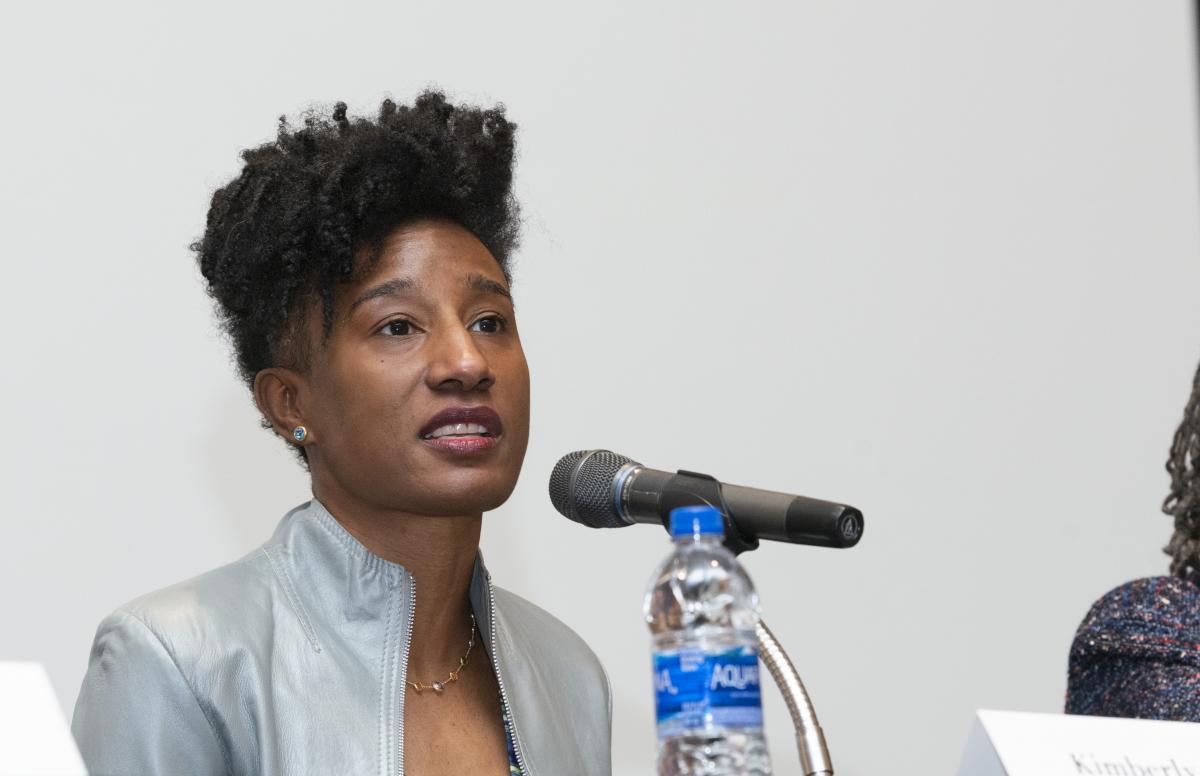 a national thought-leader on mentoring, and current editor of the Journal of Diversity in Higher Education, discussed her research, and the significance of developing a network of supporters, as opposed to relying on a single advisor during the graduate process. Ms. Amy Gardner, a clinical professor in the School of Architecture, Planning and Preservation, focused on the gains in student learning through collaboration with each other and faculty, especially with professionals outside academia and in other fields. Promoting the exchange of ideas between tradespeople, students, practitioners, and faculty, Gardner’s Integrated Design curriculum and studio structure has been adopted by the National Architectural Accrediting Board as the model for an integrated design studio and technology experience in schools throughout the country. Ms. Amy Steele, a fifth year PhD student in Astronomy studying circumstellar material around stars of various ages, is the Team Lead for Graduate Resources Advancing Diversity with Maryland Astronomy and Physics (GRAD-MAP). She spoke extensively about the work to improve representation of underrepresented minorities in astronomy and physics among incoming and current graduate students through collaborative initiatives, mentoring and a newer Summer Scholars Program. "UMD is surrounded by many minority serving institutions (MSIs) and historically black colleges and universities (HBCUs), but those students are not present at the graduate level in Astronomy. The problem isn’t lack of interest. Students need to have research experience to get into an Astronomy PhD program, and GRAD-MAP aims to help expose those students at MSIs and HBCUs to what research is, and get them going on that path. For me personally, I hope to be the third black person to get a PhD in Astronomy from UMD," said Steele.
a national thought-leader on mentoring, and current editor of the Journal of Diversity in Higher Education, discussed her research, and the significance of developing a network of supporters, as opposed to relying on a single advisor during the graduate process. Ms. Amy Gardner, a clinical professor in the School of Architecture, Planning and Preservation, focused on the gains in student learning through collaboration with each other and faculty, especially with professionals outside academia and in other fields. Promoting the exchange of ideas between tradespeople, students, practitioners, and faculty, Gardner’s Integrated Design curriculum and studio structure has been adopted by the National Architectural Accrediting Board as the model for an integrated design studio and technology experience in schools throughout the country. Ms. Amy Steele, a fifth year PhD student in Astronomy studying circumstellar material around stars of various ages, is the Team Lead for Graduate Resources Advancing Diversity with Maryland Astronomy and Physics (GRAD-MAP). She spoke extensively about the work to improve representation of underrepresented minorities in astronomy and physics among incoming and current graduate students through collaborative initiatives, mentoring and a newer Summer Scholars Program. "UMD is surrounded by many minority serving institutions (MSIs) and historically black colleges and universities (HBCUs), but those students are not present at the graduate level in Astronomy. The problem isn’t lack of interest. Students need to have research experience to get into an Astronomy PhD program, and GRAD-MAP aims to help expose those students at MSIs and HBCUs to what research is, and get them going on that path. For me personally, I hope to be the third black person to get a PhD in Astronomy from UMD," said Steele.
"Perhaps the highlight for me was the story Brit Kirwan told about how excellence in graduate education was behind the extraordinary deal struck between university and state to improve the quality of the undergraduate student body. What a remarkable transformation in the University the excellence at both graduate and undergraduate education have brought about, reaping countless benefits for the state and beyond," remarked former Provost and Graduate Dean Ann Wylie.
Special thanks to: Amanda Strausser, Megan Gebregziabher, Javiera Caceres, Anne Turkos, Kendall Aughenbaugh, Mark W. Jaffe, Brian Gharala, Ross McCool, Tim Ng, and Thai Nguyen.
